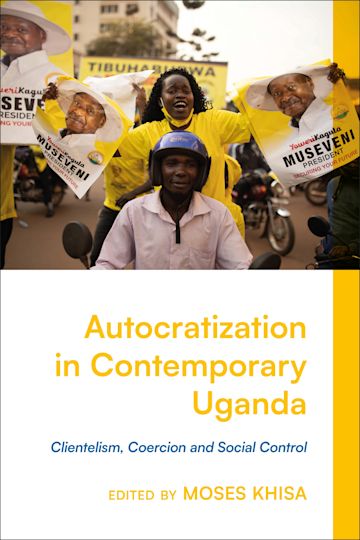Payment for this pre-order will be taken when the item becomes available
Free UK delivery on orders £30 or over
You must sign in to add this item to your wishlist. Please sign in or create an account
Autocratization in Contemporary Uganda analyses two interrelated outcomes: autocratisation, manifest in the deepening of personalist rule or Musevenism, and the regime resilience that has made Museveni one of Africa's current-longest surviving rulers. How has this feat been possible, and what has been the trajectory of Museveni's increasingly autocratic rule?
Surveying that trajectory since 1986, the book takes as its primary focus the years since 2005; bringing to the fore the 'autocratic turn', placing it within a broader comparative lens, and enriching it with comparative references to cases outside of Uganda. While positing the notion of 'autocratic adaptability' as a defining hallmark of Museveni's rule, the book examines the factors and forces that have made that adaptability possible, analysing the dynamics around three keys themes: institutions, resources, and coalitions. Through empirical research, each chapter seeks to demonstrate how either one or two of these three variables have functioned in propelling autocratization and assuring regime resilience - producing theoretical and and comparative implications that reach beyond Uganda.
| Published | 08 Feb 2024 |
|---|---|
| Format | Hardback |
| Edition | 1st |
| Extent | 320 |
| ISBN | 9781350323537 |
| Imprint | Zed Books |
| Dimensions | 234 x 156 mm |
| Publisher | Bloomsbury Publishing |
This compilation of insightful essays charts the autocratization of Uganda since President Yower Museveni's takeover in 1986, effectively demonstrating how the regime has become increasingly personalized and institutionally fragmented. The book shows how the longevity of the regime is a result of cooptation and coercion. Each chapter examines a different set of institutions to uncover mechanisms of institutional adaptability, pervasive clientelism, and legal manipulation. Taken as a whole, the book provides a significant contribution to our understanding of how autocracy operates today in Africa.
Aili Mari Tripp, Vilas Research Professor, University of Wisconsin-Madison, USA
In theorizing Uganda's politics, this book propels the prevailing research agenda beyond current parameters, while its empirical underpinnings provide a scholarly tone for practical future inquiry.
Joshua B. Rubongoya, Professor, Roanoke College, USA
There has been a welcome recent spate of books on the Yoweri Museveni/NRM regime in Uganda, but the breadth and depth of this anthology is quite significant and refreshing; it is also quite timely.
Joe Oloka-Onyango, Professor of Law, Makerere University, Uganda,
Autocratization in Contemporary Uganda: Clientelism, Coercion and Social Control offers a comprehensive, nuanced and insightful analysis of the complex factors behind regime resilience and autocratic deepening in Uganda and its implications. The group of authors´ collective grasp of autocratic theory and historic and contemporary debates in Ugandan politics has produced a “must read” volume for scholars and students interested in autocratization and the political and economic factors underpinning Uganda's political trajectory under President Museveni.
Lise Rakner, Professor, Department of Government, University of Bergen, Norway
The current National Resistance Movement government in Uganda rests on a puzzling combination of the stability and resilience of President Museveni's rule on the one hand, and an increasingly personalized and vulnerable system on the other. In this volume, a collective of Uganda-experts offers important and insightful perspectives on this puzzle. A must read to help us understand not only the Ugandan path but processes of autocratization on the African continent and elsewhere.
Anne Mette Kjaer, Aarhus University, Denmark
Free UK delivery for orders £30 and over
Your School account is not valid for the United Kingdom site. You have been logged out of your account.
You are on the United Kingdom site. Would you like to go to the United Kingdom site?
Error message.

